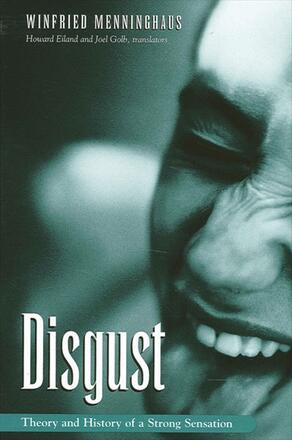INTRODUCTION: BETWEEN VOMITING AND LAUGHING.
BASE LINES OF A PHILOSOPHY OF DISGUST
Exposition / Subject Matter and Objectives of the Present Study / Aurel Kolnai, "Der Ekel" (Disgust) / Democracy as Source of Disgust: William Ian Miller's The Anatomy of Disgust
1. THE DISGUST TABOO, AND THE OMNIPRESENCE OF DISGUST IN AESTHETIC THEORY
The Beautiful as Vomitive / Aesthetic Infinity as Antivomitive / "Mixed Sensations" and the Exception of Disgust / Pleasure and Displeasure / The "Darkest of all the Senses" and the Collapse of Aesthetic Illusion in Disgust / Semanticized and "Crude" Disgust
2. DISGUSTING ZONES AND DISGUSTING TIMES: THE CONSTRUCTION OF THE IDEALLY BEAUTIFUL BODY
The Ideal Skin and Disgust at Folds and Wrinkles, Layers of Cartilage and Fat / Disgusting Depths and the Body's Openings / Forever young / The Gaping Mouth / Nose-Disgust and the "Greek Profile" / The "Flattened Ear" / "Disgusting Breasts" and Ideal "Hills" / Invisibility, Unseen Nakedness, and "Wetted Garments" / A Body "Without a Belly" / The "Spare Behind" / Excision, Castration, Hermaphroditization: the Phallus in the Field of the Beautiful / The "Hypergigantic" Sex of the "Colossal Woman" / Wounds, Dismembered Limbs, Flayed Skin: The Body as a "Disgusting Thing" / Beautiful Death and Disgusting Decay / The Ugly Old Lady / Repression or Differentiation? / Disgust, Purity, and Impurity in the Aesthetic
3. "STRONG VITAL SENSATION" AND ORGANON OF PHILOSOPHY: THE JUDGMENT OF DISGUST IN KANT
Disgust and Pleasure / Disgust as a Goal of Education / Smell, Taste, and the "Vital Sensation" of Disgust / Disgust, Laughter, and "Dark Conceptions" / Disgust as an Organon of Intellectual Critique / Disgust as Organon of Practical Action / Disgust, Happiness and Unhappiness, Ennui
4. POETRY OF PUTREFACTION: "BEAUTIFUL DISGUST" AND THE PATHOLOGY OF THE "ROMANTIC"
Classical Disgust and the Basic Alterations of the Aesthetic Field around 1800 / The Disgusting as Stimulus-Increase and Recipe of Modern "Shock"-Aesthetics / The License of "Disgusting Impotence" and the Decay of the Negative Principle / Disgusting Souls, Disgusting Times, and the Art of the Disgusting: The "Romantic" Ubiquity of the Once-Tabood / Rosenkranz on the Disgusting (1): Putrefaction as an "Inverse Becoming of the Already Dead" / Baudelaire's Poem "Une charogne" / Rosenkranz on the Disgusting (2): The Return of Indigestibility in the System of Dialectic Appropriation
5. THE "NO" OF DISGUST AND NIETZSCHE'S "TRAGEDY" OF KNOWLEDGE
Plato, Jesus, and Morals as World-Historical Agents of Disgust / "Ressentiment" and Weakness as Catalysts of Modern "Moralizing"--The Disgusting Mixture of Lies and Innocence / "Mollycoddling" as Disgust at one's own Cruelty / The Disgusting Body and Nietzsche's Physiology / "Great Disgust" and Contemporary Literature / Disgust and Cognition / Education for Disgust / Overcoming Disgust / Nietzsche Vetula
6. THE PSYCHOANALYSIS OF STINKING: LIBIDO, DISGUST, AND CULTURAL DEVELOPMENT IN FREUD
Interpretations of Disgust in Evolutionary Theory before Freud / Freud's Birth / Disgust, Aesthetic Culture, Antie-Aesthetic Libido / The Triumph of Libido: the "Perverse" Overcoming of Disgust / Perverse Father, Servant Girl, and Prostitute / Habemus Vetulam / Disgust and the Choice of Neurosis / Excretion as Prototype of Social Acts, and the Copro-Erotics of Language / "Disgusting Abuses," "Primeval Devil Worship," and the Equation of Analyst and Torturer / Art as Suspension of Disgust and Guiltless "Enjoyment" of the Rejected / Research on Disgust in Empirical Psychology after Freud
7. THE ANGEL OF DISGUST: KAFKA'S POETICS OF "INNOCENT" ENJOYMENT OF "SULPHUROUS" PLEASURES
7.1. Ugly Maidservants, Fat Old Whores, Sexual Disgust, and "Sulphurous" Obessions
Felice and Other Women with Un-Greek Noses, Skin Defects, and Bad Teeth / "Old Maids" / "I Want Only the Stout Older Ones" / Disgust with Conjugal Sexuality versus Pleasure in Disgusting Sex Outside of Marriage / "Innocence" and "You Must Possess Every Girl!" / "Dirty Fellow," Dancing and Swinging Pigs, Stinking Bitches and Self-Knowledge / Kafka the "Flabby Worm:" The Method of Making "Abominable Peculiarities" Invisible through the Form of Their Disclosure
7.2. The Transformation of the Abject into "Guiltless Enjoyment:" Writing as Devlish-Angelic "Deceiving without Deception"
7.3. Disgusting Sexuality in Kafka's Novels
Amerika, or the Trajectory of Male Innocence in the Realm of "Repellent" Female Practices / Loathsome Power and K.'s "Sexual Etiquette" in The Trial and The Castle
7.4. A Poetics of Eating and Vomiting
Broken Engagements and Disgust with Meat, Spoiled Old Food and Laxatives / On Hard Sausages and Filthy Breakfasts: Nutrition and Narration in Kafka's Amerika / Breakfast, Old Woman, and Arrest: The Opening Chapter of The Trial / Orgies of Flesh-Eating and Intoxication with Blood in Kafka's (Hunger) Stories
7.5. Incisions in Flesh and the Knife of Literature
Torture, Truth, and Disembowelled Pigs / "Like a Dog:" K.'s Execution as the Summa of Kafka's Knife-Poetics / The "Stupidity" of Torture
7.6. The Wound in the Text and the Text as Wound: The Story "A Country Doctor"
7.7. Beer-Drinking Hearse-Drivers and Cheerful Gravediggers
7.8. "Horrible Words" and Kafka's Physiology of Writing
8. Holy Disgust (Bataille) and the Sticky Jelly of Existence (Sartre)
Anti-Aesthetic of the "Formless:" Materialism of the Debased, Pollution of the Beautiful, Self-Mutilation, and the "Bliss" of Anal-Sadistic Ravages / Disgust Prohibitions and their Transgression as Societal "Core" and Stimulating Medium of Erotic Violence / "La Nausée: c'est moi"--Sartre's Elevation of Disgust to the Sole Authentic Experience of Existence
9. Abject Mother (Kristeva), Abject Art, and the Convergence of Disgust, Truth, and the Real
Repression, Repudiation, Abjection / Abject Mother, Symbolic Order, Desire / Abjection, Disgust, and Jouissance / Literature as (Perverse) Reclamation of the Abandoned / Rhythm, Laughing Apocalypse, Happy Guilt / Abject Pleasure, Disgust, Truth and the Real / Grand Narratives of the Heterogeneous / AIDS, Disgust, and Affirmative Abjection: On the Political Appropriation of Kristeva / The Academic Career of the "Abject" / Abject Art
NOTES
BIBLIOGRAPHY
